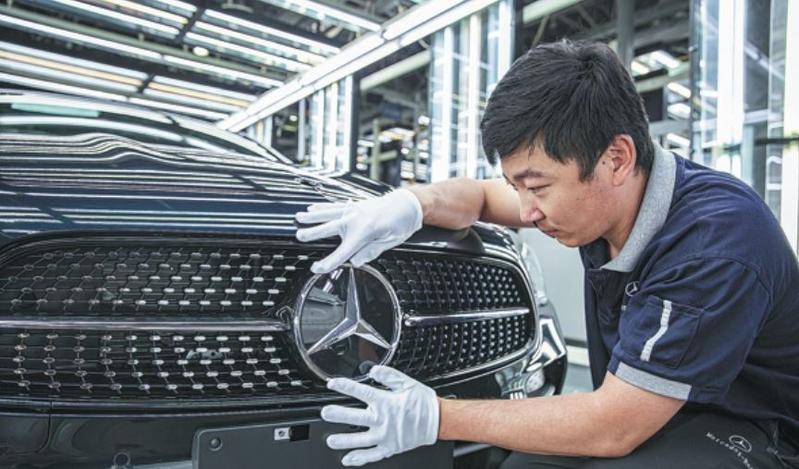 In this undated photo, a Mercedes-Benz employee adjusts a car's badge at one of the marque's production bases in China. (PHOTO PROVIDED TO CHINA DAILY)
In this undated photo, a Mercedes-Benz employee adjusts a car's badge at one of the marque's production bases in China. (PHOTO PROVIDED TO CHINA DAILY)
To mark 15 years of localization in the Chinese market, Daimler, parent company of Mercedes-Benz, has hailed this strategy as being a key element of its success.
Daimler started local production of Mercedes-Benz passenger cars at the Sino-German joint venture Beijing Benz Automotive Company with the E-Class back in 2005. In 2010, the first long-wheelbase E-Class dedicated to customers in China rolled off the assembly line.
Today, locally-produced Mercedes-Benz passenger cars include a range of eight different models, including four long-wheelbase models exclusively designed for customers in China, and one battery electric vehicle.
Starting from the very first localized Mercedes-Benz E-Class, the Beijing Benz plant has been continuously making enhancements to ensure that it complies with Mercedes-Benz's global unified production standard
Early this September, the new Mercedes-Benz E-Class Long-Wheelbase, tailored to the Chinese market, rolled off the assembly line of the joint venture in Beijing, and hit a local production record of 3 million passenger cars. A few weeks later, this special new model made its market launch in China at the Beijing auto show in late September.
ALSO READ: Daimler chief eyes China growth in next decade
Fifteen-year localization
Starting from the very first localized Mercedes-Benz E-Class, the Beijing Benz plant has been continuously making enhancements to ensure that it complies with Mercedes-Benz's global unified production standards. One point is the Quality Live system built using internet of things technology. The system enables employees to check the quality of every vehicle in real time, identifies potential issues and proposes effective solutions for quality management.
Throughout the production of the E-Class Long-Wheelbase, a range of highly precise robots are equipped for stamping, welding, painting and assembly processes to ensure efficiency and accuracy with micron-level processing precision.
For the production of the E-Class Long-Wheelbase, the plant utilizes optical inspection equipment for surface defects of stamped parts, that can detect invisible defects within 30 seconds. It's the world's leading defect detection system for stamped parts.
On the production site, automated guided vehicles, or AGVs, can be seen operating in an orderly manner to transit vehicle parts with accurately calculated routes, enhancing the transportation efficiency and agility throughout the production process. The plant is also testing some pilot projects, exploring ways to bring 5G technology into real use to further increase its productivity.
Footprint in R&D
Local talents and research and development are also integral parts of Daimler's localization efforts. With a strong local team and comprehensive training programs for employees, Daimler continues to contribute to the development of the Chinese automotive industry. To even better learn the tastes of customers in China and develop products that fit local demand, the Mercedes-Benz Research & Development China Center was opened in Beijing in 2014, and has become Daimler's most comprehensive R&D center outside of Germany.
Daimler has also expanded its cooperation with IT companies to further improve the digital experience for customers in China. For instance, the integration of China specific connectivity features and smart home solutions provide customers with a more seamless digital experience.
As for MPV products, the first Mercedes-Benz Vans Research and Development Center outside Germany was established in Fuzhou in 2013, with a scope of work including product development and prototype construction, as well as component and vehicle testing. With the design, construction and equipment strictly aligned with Daimler's global standards, the center boasts advanced facilities needed for vehicle development.
For more than a decade, Mercedes-Benz has manufactured vans catering to the needs of customers in China at the Sino-German joint venture Fujian Benz Automotive Company.
REDA MORE: Mercedes-Benz committed to premium customer care
Currently, the carmaker is locally producing two van models, the V-Class and the Vito, at the Fuzhou-based plant. The new Mercedes-Benz V-Class L celebrated its market launch in September.
With major milestones for localization in 2020, Daimler remains dedicated to its strategy of further investment and expanding its local footprint in production, research and development and purchasing to even better serve the needs of its customers in China.


